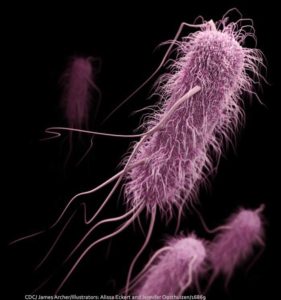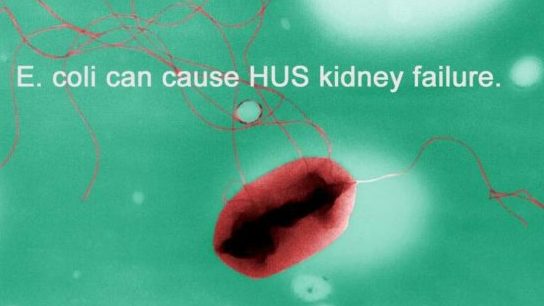The E. coli-HUS lawyers at Pritzker Hageman, P.A. help people who develop kidney failure after eating contaminated food or visiting a petting zoo. Pritzker Hageman recently won a $7.5 million lawsuit for a child who contracted an E. coli O157:H7 infection and developed hemolytic uremic syndrome (HUS).
Contact our E. Coli Attorneys for Help
E. coli-HUS Lawsuit Compensation

If a patient’s case of E. coli-HUS can be linked to a food product or restaurant, the patient may have the right to sue for compensation and justice.
If your loved one has hemolytic uremic syndrome (HUS), it is most likely because he or she ate food tainted with E. coli bacteria. Your family member is fighting for his or her life and is at risk of future kidney problems. For this reason, our lawyers help families get the compensation they need now and and to pay for health problems in the future.
It is also important to get answers:
- How did the patient, usually a child, contract the E. coli infection?
- What food product was contaminated?
- How did it get contaminated?
- What safety measures should have been taken to prevent both the contamination and the sale of the product?
Complications of HUS Kidney Failure
Hemolytic Anemia
The combination of letters and numbers in the name of the bacterium refers to the specific markers found on its surface, which distinguishes it from other types of E. coli. Hemolytic anemia and associated blood complications can cause:
- Kidney failure and the associated uremia (which develops when urea and other waste products are retained in the blood);
- Gall stones, probably caused by rapid hemolysis, which is the breaking open of red blood cells and the release of hemoglobin;
- Elevated pancreatic enzyme levels that could lead to insulin-dependent diabetes mellitus and/or pancreatitis;
- Central nervous system (CNS) disturbances such as irritability, behavior changes, disorientation, delirium, hallucinations, dizziness, tremors, and several other serious problems associated with E. coli and the brain, including seizures, coma, stroke, and encephalopathy;
- Acute respiratory distress syndrome (ARDS);
- Convulsions;
- Heart attack and failure;
- Cortical blindness, caused by damage to the visual area in the brain’s occipital cortex;
- Thrombocytopenia (platelet deficiency in the blood);
- Death.
Microangiopathic hemolytic anemia (MAHA) occurs when there are not enough red blood cells in the blood because:
- They have been prematurely destroyed by fibrin-coated platelet clumping in blood vessels.
- The bone marrow is unable to increase production to make up for the premature destruction of red blood cells.
Stroke
There are two categories of stroke:
- Ischemic, which in these cases are thrombotic, meaning they are caused by a thrombus (blood clot) that develops in the arteries supplying blood to the brain; and
- Hemorrhagic, which occurs when a blood vessel in the brain leaks or ruptures.
Hemodialysis can help, but this type of treatment can also cause hemorrhage.
Seizures are a Sign that the Body is Being Poisoned
Seizures can be caused by kidney failure and the resulting uremia (urea and other waste products staying in the blood due to kidney failure), hyponatremia (sodium levels are low and water levels are high) or other metabolic issues. The seizures are a sign that the body is being poisoned.
These conditions can be caused by factors other than uremia, including vascular damage, cerebral hemorrhage, or high fever.
In cases where seizures are not readily controlled, the patient may be put into a medically-induced coma.
Encephalopathy
Encephalopathy is a term used when there is brain disfunction or alteration. When the kidneys fail, toxins the kidneys should have excreted in the urine get into the blood and circulate throughout the body. One of the areas most often damaged is the central nervous system (CNS).
Research suggests that most HUS victims suffer this type of complication.2 This is important legally because compensation should reflect this serious problem and any other expected long-term neurological problems. Some of our clients have suffered severe brain damage.
Pancreatitis
Pancreatitis is inflammation of the pancreas, a large gland behind the stomach and close to the duodenum—the first part of the small intestine. Normally, digestive enzymes secreted by this organ do not become active until they reach the small intestine. But when the pancreas is inflamed, the enzymes inside it attack and damage the tissues that produce them.
In severe cases, bleeding, infection, and permanent tissue damage may occur.5
Heart Problems
Uremia can affect heart function, leading to congestive heart failure. Even young children with HUS are at risk.
Examples of victims suffering heart problems:
- A 13 year old girl presented with hemolytic uremic syndrome due to an Escherichia coli O157:H7 infection. She died during the acute phase of the illness after an episode of unexplained sudden circulatory collapse. Postmortem examination confirmed the diagnosis and showed histological evidence of myocarditis manifested by the presence of inflammatory cell infiltration in the myocardium and around the conducting system.3
- A 47-year-old woman presented with severe hemolytic uremic syndrome followed by heart failure. This case indicates the importance of cardiac monitoring in these cases and the need for prolonged medical support.4
Acute Respiratory Distress Syndrome
E. coli-associated HUS can lead to acute respiratory distress syndrome, which is severe lung damage that may require mechanical ventilation. When this condition happens, the risk of dying is extremely high, particularly because these patients often have kidney failure and damage to other organs as well.
If the person with this complication lives, hospitalization and rehabilitation can last for months. In addition, they will almost always suffer permanent damage physically, mentally, and emotionally.
Complications for this condition include those associated with mechanical ventilation:
- tracheal stenosis, vocal cord dysfunction
- ventilator-associated pneumonia
- stress-related gastrointestinal hemorrhage
- cardiac arrhythmias
- myocardial dysfunction
- barotrauma (pneumothorax, pneumomediastinum, pneumoperitoneum, air embolism)
- hypotension
- mechanical damage from central line placement.6,7
E. coli-HUS Attorneys Obtain $4.5 Million Settlement
Attorneys at Pritzker Hageman recently won $4.5 million for a young woman in a lawsuit against a restaurant. Our client had this to say:
“My kidneys are still significantly damaged and the doctor has informed me that the function of my kidneys will only decline. My mother found Pritzker law while looking for information about food-borne illnesses. We hadn’t considered a lawsuit, but after speaking with Mr. Pritzker and doing our research on the firm, we reconsidered. I found that members of the firm were more knowledgeable than some of my doctors on food-borne illnesses.”
Client Testimonial

E. coli O157 causes 90% or more of all cases of HUS. Other serotypes of the bacteria can also cause this illness. We have also represented clients who contracted E. coli O111 and O145 infections.
Complications from E. coli infections generally occur around the eighth day after the patient gets diarrhea, but it can happen much sooner. Anyone with severe gastrointestinal illness accompanied by watery or bloody diarrhea, especially children, the elderly, and those with compromised immune systems should get immediate medical attention.
You can click here now if you want a free consultation. Talk with Eric Hageman and the other lawyers at our law firm and get information about a lawsuit and other actions that can be taken to make sure this does not happen to another family.
Resources:
1. Jörres, Achim, Management of Acute Kidney Problems, Springer, p. 201 (2009).
2. Jörres, Achim, Management of Acute Kidney Problems, p. 198.
3. Abu-Arafeh I, Gray E, Youngson G, Auchterlonie I, Russell G, Myocarditis and haemolytic uraemic syndrome,Arch Dis Child, Jan;72(1):46-7 (1995).
4. Alexopoulou, Alexandra, et. al, Dilated Cardiomyopathy during the Course of Hemolytic Uremic Syndrome, International Journal of Hematology, Volume 86, Number 4:333-336 (2007).
5. Russell, James and Walley, Keith, Acute Respiratory Distress Syndrome, Cambridge University Press (1999), p. 257.
6. Mortelliti, M.D., Michael and Manning, M.D., Harold, Acute Respiratory Distress Syndrome, American Family Physician (May 2002) 65(9):1823-1831.
Information
- Central Nervous System Damage
- Children and Kidney Failure
- E. coli and Brain Damage
- E. coli and Coma
- E. coli O145 and HUS
- Encephalopathy
- Heart Problems
- Hemolytic Anemia
- HUS and Pancreatitis
- HUS and Seizures
- Lawsuit Settlement
- Respiratory Distress Syndrome, ARDS
- Stroke and Hemolytic Uremic Syndrome
- Minnesota E. coli Lawyer
- Treatment
Our law firm has won settlements for clients in across the United States: Arizona, California, Colorado, Georgia, Illinois, Indiana, Iowa, Kansas, Maine, Massachusetts, Michigan, Minnesota, Missouri, Nebraska, Nevada, New Jersey, New York, North Carolina, North Dakota, Ohio, Oregon, Pennsylvania, Rhode Island, South Dakota, Virginia, Wisconsin, and Wyoming.
 The combination of letters and numbers in the name of the bacterium refers to the specific markers found on its surface, which distinguishes it from other types of E. coli. Hemolytic anemia and associated blood complications can cause:
The combination of letters and numbers in the name of the bacterium refers to the specific markers found on its surface, which distinguishes it from other types of E. coli. Hemolytic anemia and associated blood complications can cause: